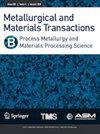用µ(I)-流变学模拟氧化铝加料
IF 3.1
2区 材料科学
Q3 MATERIALS SCIENCE, MULTIDISCIPLINARY
Metallurgical and Materials Transactions B-Process Metallurgy and Materials Processing Science
Pub Date : 2023-05-30
DOI:10.1007/s11663-023-02812-6
引用次数: 0
摘要
摘要:为了保持稳定的hall - hsamro过程,氧化铝的有效加料和溶解是必要的。一剂氧化铝含有几千粒颗粒,模拟单个颗粒的运动在实践中是不可能的。目前的工作建议通过使用µ(I)-流变学的连续配方来模拟氧化铝剂量。流变学在OpenFOAM中作为粘度模型实现,初始验证案例的平均偏差低于0.1%,基准案例的平均偏差为7.4%。参数研究中,模拟颗粒在平面上坍塌,确定了两个流变学参数$$\mu _2$$ μ 2和$$I_{\text{0}}$$ I 0特别重要,占所见变化的70%以上。最后,模拟冰晶石中给药的三相情况,µ(I)-流变学能够使部分剂量分散到熔体中并分离,这与实验中看到的一致。目前的工作还能够将该模型与早期开发的凝固模型相结合,因此,为开发氧化铝馈送的完整模型创建了一个框架。本文章由计算机程序翻译,如有差异,请以英文原文为准。
Modeling Alumina Feeding With the µ(I)-Rheology
Abstract Efficient feeding and dissolution of alumina are necessary in order to maintain a stable Hall–Héroult process. One dose of alumina contains several thousand grains, and simulating the motion of individual particles is in practice impossible. The current work proposes to model the alumina dose through a continuous formulation, using the µ (I)-rheology. The rheology is implemented as a viscosity model in OpenFOAM and initial verification cases showed an average deviation below 0.1 pct, and a benchmark case had an average deviation of 7.4 pct. A parametric study, where grains were simulated to collapse on a flat surface identified the two rheology parameters $$\mu _2$$ μ 2 and $$I_{\text{0}}$$ I 0 to be of particular importance, accounting for more than 70 pct of the variation seen. Finally, three-phase cases simulating the feeding of a dose in cryolite were conducted, and the µ (I)-rheology was able to let the parts of the dose disperse into the melt and detach, which is in accordance with what has been seen in experiments. The current work was also able to couple the model with an earlier developed solidification model, hence, creating a framework for developing a full model for alumina feeding.
求助全文
通过发布文献求助,成功后即可免费获取论文全文。
去求助
来源期刊

CiteScore
4.90
自引率
20.00%
发文量
293
审稿时长
4.7 months
期刊介绍:
Focused on process metallurgy and materials processing science, Metallurgical and Materials Transactions B contains only original, critically reviewed research on primary manufacturing processes, from extractive metallurgy to the making of a shape.
A joint publication of ASM International and TMS (The Minerals, Metals and Materials Society), Metallurgical and Materials Transactions B publishes contributions bimonthly on the theoretical and engineering aspects of the processing of metals and other materials, including studies of electro- and physical chemistry, mass transport, modeling and related computer applications.
Articles cover extractive and process metallurgy, pyrometallurgy, hydrometallurgy, electrometallurgy, transport phenomena, process control, physical chemistry, solidification, mechanical working, solid state reactions, composite materials, materials processing and the environment.
 求助内容:
求助内容: 应助结果提醒方式:
应助结果提醒方式:


